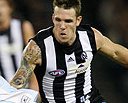JackJumpers' NBL title was special - but where does it sit among Tasmania’s top ten sporting moments?
It’s a pretty good time to be a Tasmanian sports fan right now. After years in the sporting wilderness with not much to celebrate,…
 The Federal Election was largely panned by most voters as being irrelevant to their day to day life. However, with the issue of the anti-siphoning list still to be resolved, a potentially explosive issue could be boiling away behind the scenes. In my opinion, the anti-siphoning legislation is a bit of a microcosm of Australian politics.
The Federal Election was largely panned by most voters as being irrelevant to their day to day life. However, with the issue of the anti-siphoning list still to be resolved, a potentially explosive issue could be boiling away behind the scenes. In my opinion, the anti-siphoning legislation is a bit of a microcosm of Australian politics.
Everyone wants their sport to get a massive broadcasting rights deal, but no one wants to pay the cost of how that deal gets put together.
The day sports attracts a demographic which is attractive to Oxfam, I’m sure we’ll get commentators waxing lyrical about the benefits of donating to save the Amazon rainforest.
But until that day, people better get used to hearing the latest odds from TAB Sportsbet.
How either of the major parties would handle the issue of the anti-siphoning list was largely ignored during the election. This was for a few reasons.
First, in the modern political culture of getting a handful of issues and ramming it down the voter’s throats for five weeks, it was highly unlikely it would make the podium.
Second, the Coalition actually didn’t have a policy for it going into the election, so the ALP simply parked theirs.
Third, there was no rush to produce one because any policy which differed from the status quo could be perceived as being “anti-sport”, and in the marginal seats in which this election was fought, that would have been a serious no-no.
Finally, when you are fighting a campaign through the media, why run the risk of seriously pissing off any particular section by making it look unlikely they would be able to hold onto their precious sporting code?
Neither party would have felt the need to give the editorials any further ammunition to put the boot into their campaign.
However, despite their avoidance of the issue who ever forms government could have a major impact on the sporting landscape in this country.
It may not have the hype of the mining lobby, but the various parties have been as keen to get their point across.
This is a game of high stakes.
Foxtel and Fox Sports were the most profitable television companies in Australia last financial year, but both need to crank up weak subscription growth and everyone knows the best way to flog satellite dishes is through sport.
Re-runs of MASH, for whatever reason, just don’t have the same appeal.
Furthermore, by the end of the next financial year, broadcasters could well have spent almost $2 billion for the rights to show AFL and NRL. The new anti-siphoning list is the key to determining the shape of those bids.
FTA agreements are simply not the be all and end of the agreements.
First, it takes an aggressive bidder out of the market place. Secondly, there are yet to be guarantees that would stop a channel just parking low ratings sports on their secondary HD channels (which have even a lower reach than Pay TV).
Thirdly, they fail to embrace the various online deals which may exist.
Current Communications Minister Stephen Conroy understands well the importance of getting the list right. Watching his beloved Collingwood lose to the Western Bulldogs in the final round last season, he was struck by the fact that despite Collingwood having 20 of its 22 regular season matches broadcast on free-to-air television in Melbourne in 2009, this match appeared live on Pay TV.
Conroy was bemused. Why was such the match relegated to a medium that reaches less than 35 percent of households?
His argument was: what is the point of legislation that prevents Pay TV from bidding directly for mainstream sport if the match of the round is not shown live on free-to-air?
For what is worth, a senior figure in the Liberal Party told me that could see no sense in any such list which simply “inhibited the market.”
But such a comment would see the same figure dragged through the streets if suddenly NRL, AFL, Rugby Test matches and Socceroos home games, where suddenly accessible only through subscription TV. If anything, it would be proof that the free market sounds good but never wins many votes.
Finally, I wonder how many rugby league fans are paying attention to the electoral counting in the Tasmanian seat of Denison.
The Independent Andrew Wilkie is leading, and one of his main platforms is poker machine reforms. The ex-intelligence analyst would like to see a maximum bet of $1 being placed on poker machines and machines incapable of accepting anything higher than a $20 bill.
Despite the social merits of his arguments, any attack on poker machines would have many rugby league bosses waking up in cold sweats.
Perhaps it’s important to ask whether Bob Katter is a Cowboys fan?